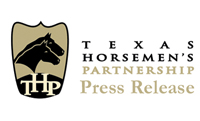|

|
 |
THP Press Release (April 10, 2008): TTHBPA
Board Unanimously Votes to Require any ADWs Seeking to Accept Wagers on
Races at Lone Star Park to Enter into a Licensing Agreement with the Thoroughbred
Horsemen’s Group
The Texas Horsemen’s Partnership took a vital first step on April 9 to ensure that the sport of racing is adequately funded from the growing business of account wagering. Members of the organization’s Texas Thoroughbred HBPA, Inc. board of directors voted unanimously to require any advance deposit wagering (ADW) company that seeks to accept wagers on races at Lone Star Park at Grand Prairie, which begins its 2008 racing season tonight, to enter into a licensing agreement with the Thoroughbred Horsemen’s Group (THG). Formed in December and comprised of 18 horsemen’s organizations with contracts at 52 racetracks in North America, the THG advocates a reformation of the revenue division from account wagering. The Texas Horsemen’s Partnership suggested that revenues on Lone Star Park racing be divided equally between purses for racing, racetrack operations and account wagering providers. To date, TrackNet Media, which represents Lone Star Park in the sale of its simulcast signal, has not agreed that purses for races should be funded equally and has declined to enter into the required licensing agreement on behalf of the two account wagering companies it also represents, XpressBet and TwinSpires.com. “We’re very concerned that the current revenue model for account wagering is dysfunctional and that the revenue stream is not adequately divided in order to fund racing,” said Tommy Azopardi, executive director of the Texas Horsemen’s Partnership. When patrons at Lone Star Park bet on live racing, seven cents per wagering dollar are returned to purses, but when patrons bet through an account wagering company instead, purses get only two cents per dollar—a 71% reduction in purse revenue, Azopardi noted. Since account wagering represents the most robust growth sector in racing, fewer dollars every year are going back to bolster racing, which is the main product sustaining racetracks, horsemen and the account wagering providers. “This is an alarming trend,” Azopardi said. “The Texas horsemen are not going to participate in that anymore. We’re standing on principles, and we joined the THG because we want to try to fix this broken revenue model.” “We are focused on increasing the revenue for racing,” said Carl Moore, president of the Texas Thoroughbred HBPA, Inc. board. “There is no way the horsemen can support account wagering without being sure that live racing—which is the backbone for racetracks, wagering providers and horsemen—is adequately supported with resulting revenue.” THG estimates that 25% of account wagering is allocated to purses, compared to 40-50% from on-track and inter-track wagering. Account wagering has grown from virtually nothing a decade ago to $1.5 billion in 2007, a total that is more than 10% of the overall pari-mutuel handle in the United States. Racetracks and purses together receive only about half of the revenue generated by account wagering, according to THG studies, compared to more than 90% of the revenue produced by on-track and inter-track wagering. “Wagering at our racetracks on both live and simulcast races continues to decline across the nation, while wagering over the Internet on the same races continues to increase. We must be very careful as these wagering patterns shift to protect the revenue contributed to our racetracks and purses,” said THG President Bob Reeves. “The gap between the revenue from an on-track wager and a wager placed on the same race through an account wagering company must be narrowed in order for Thoroughbred horse racing to continue to survive.” |
| Back to News |
BENEVOLENCE | BENEFITS | GROOM ELITE | PERSONNEL | LINKS | CONTACT US
